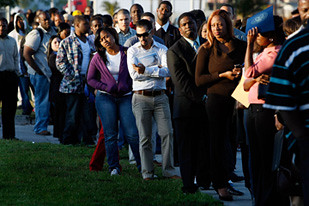
People wait by the thousands in the United States in a hopeless quest for meaningful employment. Despite claims by the Obama administration of a potential recovery, unemployment and home foreclosures continue to rise., a photo by Pan-African News Wire File Photos on Flickr.
Election over, Obama to face same weak economy
1:36am EST
By Lucia Mutikani
WASHINGTON (Reuters) - Americans have given President Barack Obama the benefit of doubt that he has the best fix for the ailing economy.
In reality, there may not be much he can do to speed up growth and employment.
Obama edged out Republican Mitt Romney in the race for the White House on Tuesday, a victory made more difficult by voter frustrations over the sluggish pace of the economy's recovery and worries about sky-high public debt.
The president's best chance to kick-start faster growth is to remove the recession threat posed by the $600 billion in tax hikes and government spending cuts known as the "fiscal cliff," which is already weighing on business investment decisions.
And all the better if he can do that in concert with securing a longer-term deal that puts the budget on a more sustainable path - a tall order given the still-divided nature of Washington politics.
"Obama will have to nail down some of these fiscal issues in order to get the economy moving quickly," said Mark Zandi, chief economist at Moody's Analytics in West Chester, Pennsylvania. "If he is unable to do that, we're going to be stuck."
The world's largest economy has struggled to achieve anything like strong growth since climbing out of the deep 2007-09 recession.
Annual gross domestic product expanded by an average of just 2.1 percent over the last two years. Only about 4.5 million of the 8.7 million jobs lost during the downturn have been recouped. About 23 million Americans are either unemployed or underemployed, many of them having to settle for part-time work.
Not only is government borrowing at an unsustainably high rate, with a debt now towering over $16 trillion, but the recession left lasting scars on the labor market that is likely to keep unemployment elevated for years to come.
What's more, growth is slowing overseas, crimping U.S. exports.
POLITICAL GRIDLOCK REMAINS
While Obama's Democrats retained control of the Senate, Republicans kept their grip on the House of Representatives, maintaining Washington's political gridlock.
During his first term, Obama was unable to bridge the divide between the two parties over how to trim the budget deficit and there is little to suggest it will be easier this time around.
He has called for slashing the deficit by more than $4 trillion over a 10-year period through raising taxes for wealthy Americans and cutting defense spending, two steps that are unpopular with Republicans.
"Dealing with partisanship and gridlock in Congress will remain a major challenge, today's election result certainly does not make the situation any easier," said Harm Bandholz, chief U.S. economist UniCredit Research in New York.
Full implementation of Obama's deficit-cutting plan would dent growth in 2013, and some economists expect he would offer some form of tax relief for households to soften the blow.
LEGACY OF A CRISIS
Even if Obama manages to strike a deficit deal with Congress, it would likely add only a few tenths of a percentage point to economic growth given that it would not address the main problem holding the recovery back: the massive loss of wealth during the recession.
Median family net worth dropped 38 percent between 2007 and 2010 as housing prices plummeted, the biggest decline for any period on record, and almost 11 million Americans are estimated to owe more on their mortgages than their homes are worth.
In addition, many of the jobs lost during the recession, particularly in construction and other housing-related areas like finance, may never come back. That could leave much of the U.S. workforce lacking the skills employers need.
"The job situation is going to be problematic because my reading is the unemployment we suffer is to some large degree structural," said Adolfo Laurenti, deputy chief economist at Mesirow Financial in Chicago. "Even a strong economy will have a hard time reducing the employment rate to below 7 percent."
The jobless rate stood at 7.9 percent in October.
The economy is also being buffeted by the debt crisis in Europe and cooling demand in China, which has undermined demand for U.S. businesses. Exports had accounted for about a third of growth since the recession ended.
"We are in a globalized economy with no healthy global engine for economic growth. That's a problem that cannot be easily fixed by Obama," said Laurenti.
(Reporting by Lucia Mutikani; Editing by Tim Ahmann and Paul Simao)
No comments:
Post a Comment